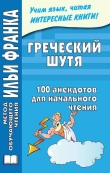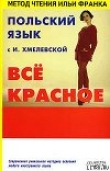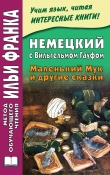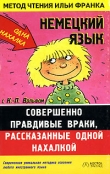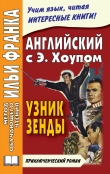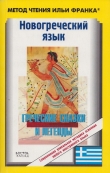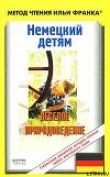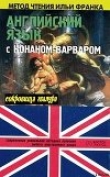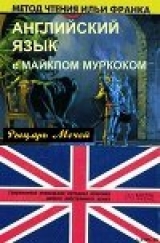
Текст книги "Английский язык с М. Муркоком"
Автор книги: Майкл Джон Муркок
Соавторы: Илья Франк,Андрей Еремин
Жанры:
Языкознание
,сообщить о нарушении
Текущая страница: 15 (всего у книги 36 страниц)
But how many days had he slept (но сколько дней он проспал)?
He stirred again in the bed (он снова пошевелился в постели; to stir – шевелить/ся/, двигать/ся/; копошиться) and felt the soft warmth of another beside him, on his blind side (и ощутил мягкое тепло другого /тела/ возле себя, на своей слепой стороне = со стороны, где был незрячий глаз). He turned his head and there was Rhalina (он повернул голову – там была Ралина), her eyes closed, her sweet face at peace (ее глаза были закрыты, а привлекательное лицо – безмятежно: «в мире»; sweet – сладкий; приятный, очаровательный).
strength [streŋƟ] warmth [wɔ:mƟ] peace [pi:s]
It slowly came to him that he was much refreshed. For the first time since he had set off on his quest, he felt full of energy and well-being. Even the darkness in his mind seemed to have retreated.
So the Margravine had drugged him, but now, it seemed, it had been a drug to make him sleep, to help him regain his strength.
But how many days had he slept?
He stirred again in the bed and felt the soft warmth of another beside him, on his blind side. He turned his head and there was Rhalina, her eyes closed, her sweet face at peace.
He recalled his dreaming (он вспомнил свой сон). He recalled the comfort he had been given (вспомнил покой, /который/ он обрел: «ему дали»; comfort – удобство; нега, утешение) as all the misery in him poured forth (словно все страдания его: «в нем» ушли; misery – страдание, несчастье; to pour – лить/ся/, выливаться; to pour forth – изливать /чувства/; сыпать словами).
Rhalina had comforted him (Ралина успокоила его = подарила ему этот покой). He reached out with his good hand to stroke the tumbled hair (он потянулся своей здоровой рукой, чтобы погладить спутанные волосы; to tumble – приводить в беспорядок, ворошить, ерошить /волосы/). He felt affection for her (он чувствовал привязанность к ней) – an affection almost as strong as he had felt for his own family (привязанность почти такую же сильную, как он испытывал к своей семье).
Reminded of his dead kin (вспомнив о погибших родственниках), he stopped stroking her hair (он прекратил гладить ее волосы) and contemplated, instead, the puckered stump of his left hand (и уставился вместо этого на сморщенный обрубок левой руки; to contemplate – /пристально/ разглядывать, созерцать). It was completely healed now (он = рана полностью зажила теперь), leaving a rounded end of white skin (оставив округленный край белой = светлой кожи). He looked back at Rhalina (он оглянулся на Ралину). How could she bear to share her bed with such a cripple (как она могла разделить ложе с таким калекой; to bear – выдерживать, переносить)?
misery [ˈmɪzərɪ] poured [pɔ:d] contemplated [ˈkɔntəmpleɪtɪd] rounded [ˈraundɪd]
He recalled his dreaming. He recalled the comfort he had been given as all the misery in him poured forth.
Rhalina had comforted him. He reached out with his good hand to stroke the tumbled hair. He felt affection for her – an affection almost as strong as he had felt for his own family.
Reminded of his dead kin, he stopped stroking her hair and contemplated, instead, the puckered stump of his left hand. It was completely healed now, leaving a rounded end of white skin. He looked back at Rhalina. How could she bear to share her bed with such a cripple?
As he looked at her, she opened her eyes and smiled at him (когда он посмотрел на нее, она открыла глаза и улыбнулась ему).
He thought he detected pity in that smile (ему показалось, он заметил жалость в той улыбке; to detect – замечать, обнаруживать) and was immediately resentful (и тотчас же обиделся; resentful – обиженный, возмущенный; to resent – негодовать, возмущаться; обижаться). He began to climb from the bed (он принялся выбираться из постели; to climb – взбираться, карабкаться), but her hand on his shoulder stopped him (но ее рука на его плече остановила его).
`Stay with me Corum, for I need your comforting now (останься со мной, Корум, потому что мне нужно твое утешение теперь).
He paused, looked back at her suspiciously (он помедлил, оглянувшись на нее подозрительно).
`Please, Corum. I believe that I love you (кажется, я люблю тебя; to believe – верить; думать, полагать).
He frowned (он нахмурился).
resentful [rɪˈzentful] shoulder [ˈʃəuldə] suspiciously [səˈspɪʃəslɪ]
As he looked at her, she opened her eyes and smiled at him.
He thought he detected pity in that smile and was immediately resentful. He began to climb from the bed, but her hand on his shoulder stopped him.
`Stay with me Corum, for I need your comforting now.
He paused, looked back at her suspiciously.
`Please, Corum. I believe that I love you.
He frowned.
`Love (любовь)? Between Vadhagh and Mabden (между вадагом и мабденом)? Love of that kind (любовь этого вида = что же это за любовь)? He shook his head (он покачал головой). `Impossible (невозможно). There could be no issue (не может быть никакого плода = детей /от такой любви/; issue – исход, результат; потомство, дети).
`No children, I know. But love gives birth to other things (но любовь дает рождение другим вещам = любовь – это не только дети; to give birth to – родить, произвести на свет; дать начало) …
`I do not understand you (я не понимаю тебя).
`I am sorry (прости), she said. `I was selfish (я была эгоистичной). I am taking advantage of you (я воспользовалась тобой = твоей слабостью; to take advantage of something – использовать что-либо в своих интересах; пользоваться преимуществом чего-либо). She sat up in bed (она села в постели). I have slept with no one else since my husband went away (я не делила ложе: «не спала» больше ни с кем, с тех пор как мой муж уплыл). I am not (я не) …
Corum studied her body (Корум рассматривал ее тело). It moved him and yet it should not have done (оно = красота ее тела взволновала его, однако не должна была; to move – трогать, волновать; вызывать /чувства, эмоции и т. д. /). It was unnatural for one species to feel such emotion for another (было неестественным для /представителя/ одного вида испытывать подобное чувство к /представителю/ другого) …
issue [ˈɪʃu:] advantage [ədˈvɑ:ntɪʤ] unnatural [ʌnˈnæʧ (ə) rəl] species [ˈspi:ʃi:z]
`Love? Between Vadhagh and Mabden? Love of that kind? He shook his head. `Impossible. There could be no issue.
`No children, I know. But love gives birth to other things…
`I do not understand you.
`I am sorry, she said. `I was selfish. I am taking advantage of you. She sat up in bed. I have slept with no one else since my husband went away. I am not…
Corum studied her body. It moved him and yet it should not have done. It was unnatural for one species to feel such emotion for another…
He reached down and kissed her breast (он наклонился и поцеловал ее грудь; to reach down – тянуться /вытягивать руку/ вниз). She clasped his head (она обняла его голову; to clasp – обнимать, обхватывать, сжимать). They sank, again, into the sheets, making gentle love (они снова опустились на простыни, слившись в нежной любви; to make love – заниматься любовью; gentle – тихий, нежный, ласковый), learning of one another as only those truly in love may (постигая друг друга /так/, как только те, /кто/ действительно влюблен, могут).
After some hours, she said to him (через несколько часов она сказала ему).
`Corum, you are the last of your race (Корум, ты последний /представитель/ своего племени). I will never see my people again (я никогда не увижу моего народа снова), save for those retainers who are here (кроме тех подданных, что находятся здесь; retainer – слуга /постоянно живущий в семье/). It is peaceful in this castle (в этом замке мирно/спокойно) … There is little that would disturb that peace (мало что нарушит этот мир; to disturb – беспокоить, тревожить). Would you not consider staying here with me (не желаешь ли остаться здесь со мной; to consider – рассматривать, обдумывать, полагать) – at least for a few months (по крайней мере, на несколько месяцев)?
`I have sworn to avenge the deaths of my folk (я поклялся отомстить за смерть моих родных; to swear), he reminded her softly, and kissed her cheek (напомнил он ей тихо и поцеловал в щеку).
castle [kɑ:sl] disturb [dɪsˈtə: b] avenge [əˈvenʤ]
He reached down and kissed her breast. She clasped his head. They sank, again, into the sheets, making gentle love, learning of one another as only those truly in love may.
After some hours, she said to him.
`Corum, you are the last of your race. I will never see my people again, save for those retainers who are here. It is peaceful in this castle… There is little that would disturb that peace. Would you not consider staying here with me – at least for a few months?
`I have sworn to avenge the deaths of my folk, he reminded her softly, and kissed her cheek.
`Such oaths are not true to your nature, Corum (подобные клятвы противны твоей природе, Корум; true – верный, правильный; подходящий). You are one who would rather love than hate, I know (ты тот, кто /способен/ скорее любить, чем ненавидеть, я знаю).
`I cannot answer that (я не могу /ничего/ ответить на это; to answer – отвечать, реагировать; возражать), he replied (ответил он), `for I will not consider my life fulfilled unless I destroy Glandyth-a-Krae (потому что не буду считать свою жизнь законченной, пока не уничтожу Гландита-а-Краэ; to fulfill – выполнять, осуществлять). This wish is not so hate-begotten as you might think (это желание не такое ненавистью порожденное = порождено отнюдь не ненавистью, как ты можешь подумать; to beget – производить, /по/рождать). I feel, perhaps, like one who sees a disease spreading through a forest (я чувствую себя, пожалуй, как тот, кто видит болезнь, распространяющуюся по лесу). One hopes to cut out the diseased plants (он надеется вырубить заболевшие растения) so that the others may grow straight and live (чтобы остальные могли расти прямыми и здоровыми; live – живой; энергичный, полный сил). That is my feeling concerning Glandyth-a-Krae (таково мое отношение к Гландиту-а-Краэ). He has formed the habit of killing (он создал обычай убивать = привык убивать). Now that he has killed all the Vadhagh (теперь, когда он уничтожил всех вадагов), he will want to kill others (он захочет уничтожить другие /народы/). If he finds no more strangers (если он не найдет больше чужестранцев), he will begin to kill those wretches who occupy the villages ruled by Lyr-a-Brode (он начнет убивать тех несчастных, что занимают = живут в деревнях, управляемых Лир-а-Бродом). Fate has given me the impetus I need (судьба дала мне стимул, необходимый; impetus – побуждение, толчок, импульс; to give impetus to – стимулировать, дать толчок) to pursue this attitude of mine to its proper conclusion, Rhalina (чтобы довести эту мою миссию до должного завершения, Ралина; to pursue – выполнять, совершать; придерживаться /плана/; attitude – позиция, отношение, точка зрения).
disease [dɪˈzi:z] impetus [ˈɪmpɪtəs] pursue [pəˈsju:] conclusion [kənˈklu:ʒ (ə) n]
`Such oaths are not true to your nature, Corum. You are one who would rather love than hate, I know.
`I cannot answer that, he replied, `for I will not consider my life fulfilled unless I destroy Glandyth-a-Krae. This wish is not so hate-begotten as you might think. I feel, perhaps, like one who sees a disease spreading through a forest. One hopes to cut out the diseased plants so that the others may grow straight and live. That is my feeling concerning Glandyth-a-Krae. He has formed the habit of killing. Now that he has killed all the Vadhagh, he will want to kill others. If he finds no more strangers, he will begin to kill those wretches who occupy the villages ruled by Lyr-a-Brode. Fate has given me the impetus I need to pursue this attitude of mine to its proper conclusion, Rhalina.
`But why go from here now (но зачем уходить отсюда сейчас)? Sooner or later we will receive news concerning this Glandyth (рано или поздно мы получим известия об этом Гландите). When that moment arrives (когда этот момент наступит; to arrive – прибывать, добираться; наступать), then you can set forth to exact your vengeance (тогда ты сможешь отправиться /в путь/, чтобы отомстить; to exact – взыскивать, настаивать на выполнении).
He pursed his lips (он поджал губы).
`Perhaps you are right (возможно, ты права).
`And you must learn to do without your hand and your eye (и ты должен научиться обходиться без руки и глаза), she said. `That will take much practice, Corum (это потребует много практики, Корум; practice – упражнение, тренировка).
`True (верно).
`So stay here, with me (ну так останься здесь, со мной).
`I will agree to this much, Rhalina (я соглашусь с этим, Ралина). I will make no decision for a few more days (я не буду принимать никаких решений еще несколько дней).
receive [rɪˈsi:v] exact [ɪɡˈzækt] decision [dɪˈsɪʒ (ə) n]
`But why go from here now? Sooner or later we will receive news concerning this Glandyth. When that moment arrives, then you can set forth to exact your vengeance.
He pursed his lips.
`Perhaps you are right.
`And you must learn to do without your hand and your eye, she said. `That will take much practice, Corum.
`True.
`So stay here, with me.
`I will agree to this much, Rhalina. I will make no decision for a few more days.
And Corum made no decision for a month (не принимал никаких решений месяц). After the horror of his encounters with the Mabden raiders (после ужаса столкновений с мабденскими налетчиками; encounter – случайная встреча; столкновение, стычка), his brain needed time to heal (его рассудок требовал времени, чтобы исцелиться = ему требовалось время, чтобы оправиться) and this was difficult with the constant reminder of his injuries (а это было трудно из-за постоянного напоминания о его увечьях) every time he automatically tried to use his left hand or glimpsed his reflection (каждый раз, /когда/ он непроизвольно пытался использовать левую руку или мельком видел свое отражение).
When not with him, Rhalina spent much of her time in the castle's library (когда не с ним = оставляя Корума одного, Ралина проводила большую часть своего времени в библиотеке замка), but Corum had no taste for reading (но Корум не испытывал тяги к чтению; to have a taste for – иметь склонность, пристрастие к). He would walk about the battlements of the castle (он предпочитал расхаживать вдоль зубчатых стен замка; to walk about – расхаживать, прогуливаться) or take a horse and ride over the causeway at low tide (или брать лошадь и переправлялся по дамбе при отливе /на берег/) (though Rhalina was perturbed by this (хотя Ралина беспокоилась из-за этого; to perturb – возмущать, приводить в смятение; тревожить) for fear that he would fall prey to one of the Pony Tribes which occasionally ranged the area (из страха = опасаясь, что он может пасть жертвой одного из племен на пони, которые временами рыскали в этих местах; occasionally – изредка, время от времени; to range – бродить, скитаться; рыскать; area – площадь, участок, район)) and ride for a while among the trees (и скакать некоторое время среди деревьев).
encounter [ɪnˈkauntə] library [ˈlaɪbrərɪ] causeway [ˈkɔ:zweɪ] perturbed [pəˈtə: bd]
And Corum made no decision for a month. After the horror of his encounters with the Mabden raiders, his brain needed time to heal and this was difficult with the constant reminder of his injuries every time he automatically tried to use his left hand or glimpsed his reflection.
When not with him, Rhalina spent much of her time in the castle's library, but Corum had no taste for reading. He would walk about the battlements of the castle or take a horse and ride over the causeway at low tide (though Rhalina was perturbed by this for fear that he would fall prey to one of the Pony Tribes which occasionally ranged the area) and ride for a while among the trees.
And though the darkness in his mind became less noticeable as the pleasant days passed, it still remained (и хотя тьма в его душе стала менее заметной, когда отрадные дни проходили, она по-прежнему оставалась). And Corum would sometimes pause in the middle of some action (и Корум иногда замирал в середине = во время какого-нибудь действия) or stop when he witnessed some scene that reminded him of his home, the Castle Erorn (или останавливался, когда видел какую-нибудь картину /на гобелене/, которая напоминала ему о его доме, замке Эрорн).
The Margravine's castle was called simply Moidel's Castle (замок маркграфини назывался просто замок Мойдела) and was raised on an island called Moidel's Mount (и был возведен на острове под названием Гора Мойдел), after the name of the family that had occupied it for centuries (по имени семейства, которое жило на нем веками). It was full of interesting things (замок был полон интересных вещей). There were cabinets of porcelain and ivory figurines (там были залы фарфоровых изделий и статуэток из слоновой кости; cabinet – кабинет; шкаф с выдвижными ящиками; выставочное помещение), rooms filled with curiosities taken at different times from the sea (помещения, заполненные диковинками, собранными в разные времена в море; curiosity – любознательность, любопытство; диковина, редкость), chambers in which arms and armour were displayed (комнаты, в которых оружие и доспехи были выставлены), paintings (crude by Corum's standards) (картины, грубые по меркам Корума) depicting scenes from the history of Lywm-an-Esh (изображавшие сцены из истории Лиум-ан-Эш), as well as scenes taken from the legends and folktales of that land, which was rich in them (а также сцены, взятые из легенд и народных сказок этой страны, которая была богата ими; to be rich – изобиловать, кишеть). Such strange imaginings were rare among the Vadhagh (столь незнакомые грезы = причудливые фантазии были редки среди вадагов), who had been a rational people, and they fascinated Corum (которые были рациональными людьми, и они /фантазии/ заворожили Корума).
noticeable [ˈnəutɪsəbl] porcelain [ˈpɔ:s (ə) lɪn] ivory [ˈaɪv (ə) rɪ] figurine [, fɪɡjuˈri:n] curiosity [, kju (ə) rɪˈɔsɪtɪ] rational [ˈræʃ (ə) nəl] fascinated [ˈfæsɪneɪtɪd]
And though the darkness in his mind became less noticeable as the pleasant days passed, it still remained. And Corum would sometimes pause in the middle of some action or stop when he witnessed some scene that reminded him of his home, the Castle Erorn.
The Margravine's castle was called simply Moidel's Castle and was raised on an island called Moidel's Mount, after the name of the family that had occupied it for centuries. It was full of interesting things. There were cabinets of porcelain and ivory figurines, rooms filled with curiosities taken at different times from the sea, chambers in which arms and armour were displayed, paintings (crude by Corum's standards) depicting scenes from the history of Lywm-an-Esh, as well as scenes taken from the legends and folktales of that land, which was rich in them. Such strange imaginings were rare among the Vadhagh, who had been a rational people, and they fascinated Corum.
He came to realise that many of the stories concerning magical lands and weird beasts (он осознал, что многие из преданий, касавшихся волшебных земель и фантастических животных; weird – сверхъестественный, причудливый) were derived from some knowledge of the other planes (основывались на знаниях, /полученных/ из иных плоскостей; to be derived from – извлекаться, происходить из; создаваться на основе /чего-либо/). Obviously the other planes had been glimpsed (очевидно, другие плоскости были увидены кем-то мельком) and the legend-makers had speculated freely from the fragments of knowledge thus gained (а создатели легенд вольно передали фрагменты знаний, таким образом полученных; to speculate – обдумывать, размышлять; to gain – добывать, получать, приобретать). It amused Corum to trace a wild folktale back to its rather more mundane source (Коруму было интересно прослеживать необычные народные сказки обратно к их немного более земному источнику = находить их источник в реальной, земной жизни; to amuse – занимать, забавлять; wild – дикий, буйный; своенравный), particularly where these folktales concerned the Old Races (особенно /в тех местах/, где эти народные сказки касались древних рас) – the Vadhagh and the Nhadragh (вадагов и надрагов) – who were attributed with the most alarming range of supernatural powers (которые наделялись /там/ тревожным рядом = многими пугающими сверхъестественными способностями; to attribute – приписывать /свойство и т. д. /, относить к; range – ряд, группа; область, сфера). He was also, by this study, offered some insight (к нему также, благодаря этому изучению, пришло понимание; to offer – предлагать, преподносить; insight – проницательность, понимание; внезапное озарение) concerning the attitudes of the Mabden of the East (позиции мабденов востока), who seemed to have lived in awe of the Old Races (которые, казалось, жили в священном трепете перед древними расами; awe – благоговейный страх, трепет) before they had discovered that they were mortal and could be slain easily (до тех пор, пока они не обнаружили, что те – смертны и могут быть легко убиты). It seemed to Corum that the vicious genocide engaged upon by these Mabden (Коруму показалось, что жестокий геноцид, учиненный этими мабденами; vicious – порочный, дурной; ужасный; to engage – подвергать/ся/, затрагивать/ся/) was partly caused by their hatred of the Vadhagh for not being the great seers and sorcerers (был частично вызван их ненавистью к тому /факту/, что вадаги – не великие ясновидцы и колдуны) the Mabden had originally thought them to be (/как/ мабдены первоначально считали /их/).
weird [wɪəd] mundane [ˈmʌndeɪn] awe [ɔ:] vicious [ˈvɪʃəs] genocide [ˈʤenəusaɪd]
He came to realise that many of the stories concerning magical lands and weird beasts were derived from some knowledge of the other planes. Obviously the other planes had been glimpsed and the legend-makers had speculated freely from the fragments of knowledge thus gained. It amused Corum to trace a wild folktale back to its rather more mundane source, particularly where these folktales concerned the Old Races – the Vadhagh and the Nhadragh – who were attributed with the most alarming range of supernatural powers. He was also, by this study, offered some insight concerning the attitudes of the Mabden of the East, who seemed to have lived in awe of the Old Races before they had discovered that they were mortal and could be slain easily. It seemed to Corum that the vicious genocide engaged upon by these Mabden was partly caused by their hatred of the Vadhagh for not being the great seers and sorcerers the Mabden had originally thought them to be.
But this line of thought brought back the memories and the sorrow and the hatred (но это направление мысли = подобные размышления вновь пробуждали воспоминания, печаль и ненависть; line – линия, черта; направление, образ действия; to bring back – возвращать; воскрешать в памяти) and Corum would become depressed, sometimes for days (и Корум становился подавленным, иногда на несколько дней), and even Rhalina's love could not console him then (и даже любовь Ралины не могла утешить его тогда).
But then one day he inspected a tapestry in a room he had not previously visited (но потом однажды он рассматривал гобелен в комнате, /которую/ прежде /никогда/ не посещал) and it absorbed his attention as he looked at the pictures and studied the embroidered text (и тот поглотил его внимание, когда Корум посмотрел на /изображенные/ картины и изучил вышитый текст).
This was a complete legend telling of the adventures of Mag-an-Mag, a popular folk hero (это был полный /текст/ легенды, рассказывавшей о приключениях Маг-ан-Мага, популярного народного героя). Mag-an-Mag had been returning from a magical land when his boat had been set upon by pirates (Маг-ан-Маг возвращался из какой-то волшебной страны, когда на его судно напали пираты; boat – лодка, шлюпка; корабль, судно). These pirates had cut off Mag-an-Mag's arms and legs and thrown him overboard (эти пираты отрубили Маг-ан-Магу руки и ноги и выбросили его за борт; to throw), then they had cut off the head of his companion, Jhakor-Neelus (потом они отрубили голову его спутнику, Джакор-Нилусу), and tossed his body after that of his master, but kept the head, apparently to eat (и швырнули его тело вслед за телом его господина, но сохранили голову, видимо, чтобы съесть; to toss – бросать, кидать; швырять). Eventually Mag-an-Mag's limbless body had been washed up on the shore of a mysterious island (в конце концов лишенное конечностей тело Маг-ан-Мага было выброшено на берег какого-то таинственного острова; to wash up – прибивать к берегу, выбрасывать на берег) and Jhakor-Neelus's headless body had arrived at a spot a little further up the beach (а безголовое тело Джакор-Нилуса прибыло на место чуть выше по берегу; beach – /морской/ берег; пляж).
previously [ˈpri:vɪəslɪ] hero [ˈhɪ (ə) rəu] limbless [ˈlɪmlɪs]
But this line of thought brought back the memories and the sorrow and the hatred and Corum would become depressed, sometimes for days, and even Rhalina's love could not console him then.
But then one day he inspected a tapestry in a room he had not previously visited and it absorbed his attention as he looked at the pictures and studied the embroidered text.
This was a complete legend telling of the adventures of Mag-an-Mag, a popular folk hero. Mag-an-Mag had been returning from a magical land when his boat had been set upon by pirates. These pirates had cut off Mag-an-Mag's arms and legs and thrown him overboard, then they had cut off the head of his companion, Jhakor-Neelus, and tossed his body after that of his master, but kept the head, apparently to eat. Eventually Mag-an-Mag's limbless body had been washed up on the shore of a mysterious island and Jhakor-Neelus's headless body had arrived at a spot a little further up the beach.
These bodies were found by the servants of a magician (эти тела были найдены слугами волшебника) who, in return for Mag-an-Mag's services against his enemies (который, в обмен на помощь Маг-ан-Мага /в борьбе/ против своих врагов; service – служба, занятие; помощь, одолжение), offered to put back his limbs and make him as good as new (предложил вернуть его конечности и сделать его таким, как прежде; to make as good as new – обновлять; чинить). Mag-an-Mag had accepted on condition that the sorcerer find Jhakor-Neelus a new head (Маг-ан-Маг согласился при условии, что колдун найдет Джакор-Нилусу новую голову). The sorcerer had agreed and furnished Jhakor-Neelus with the head of a crane, which seemed to please everyone (чародей согласился и снабдил Джакор-Нилуса головой журавля, что, по-видимому, удовлетворило всех). The pair then went on to fight the sorcerer's enemies (пара /героев/ затем отправилась сражаться с врагами колдуна; to go on to – переходить к чему-то) and leave the island loaded down with his gifts (и покинула остров, сгибаясь под тяжестью его даров; to load down – пригибать, давить /грузом/; угнетать).
Corum could find no origin for this legend in the knowledge of his own folk (Корум не смог найти источник этой легенды в знаниях = истории своего народа). It did not seem to fit with the others (она, казалось, не соответствовала остальным /легендам/).
magician [məˈʤɪʃ (ə) n] accepted [əkˈseptɪd] origin [ˈɔrɪʤɪn]
These bodies were found by the servants of a magician who, in return for Mag-an-Mag's services against his enemies, offered to put back his limbs and make him as good as new. Mag-an-Mag had accepted on condition that the sorcerer find Jhakor-Neelus a new head. The sorcerer had agreed and furnished Jhakor-Neelus with the head of a crane, which seemed to please everyone. The pair then went on to fight the sorcerer's enemies and leave the island loaded down with his gifts.
Corum could find no origin for this legend in the knowledge of his own folk. It did not seem to fit with the others.
At first he dismissed his obsession with the legend (сначала он гнал от себя навязчивую мысль о легенде; to dismiss – освобождать, распускать; выбрасывать из головы; obsession – одержимость /желанием и т. д. /, навязчивая идея) as being fired by his own wish to get back the hand and the eye he had lost, but he remained obsessed (как вызванную собственным желанием вернуть руку и глаз, /которые/ он потерял, но он оставался одержимым /этой мыслью/; to fire – поджигать; воодушевлять, воспламенять). Feeling embarrassed by his own interest (чувствуя неловкость от своего увлечения; to feel embarrassed – чувствовать неловкость, стесняться), he said nothing of the legend to Rhalina for several weeks (он ничего не говорил Ралине о легенде в течение нескольких недель).
Autumn came to Moidel's Castle and with it a warm wind (осень пришла в замок Мойдел, а вместе с ней – теплый ветер) that stripped the trees bare and lashed the sea against the rocks (который раздевал деревья догола = срывал всю листву, разбивал море о скалы; to strip – раздевать, обнажать; сдирать; to lash – хлестать, сильно ударять) and drove many of the birds away to seek a more restful clime (и заставлял большую часть птиц искать более спокойный край; to drive away – прогонять, рассеивать; clime – край, сторона; климат).
And Corum began to spend more and more time in the room (Корум начал проводить все больше и больше времени в зале) where hung the tapestry concerning Mag-an-Mag and the wonderful sorcerer (где висел гобелен о Маг-ан-Маге и удивительном чародее). Corum began to realise that it was the text that chiefly interested him (Корум начал осознавать, что именно текст особенно заинтересовал его; chiefly – главным образом, особенно). It seemed to speak with an authority that was elsewhere lacking in the others he had seen (казалось, он гласил с авторитетом = в нем была достоверность, которой не хватало остальным /преданиям/, что он видел; authority – авторитет, вес, влияние; to be lacking – отсутствовать, недоставать; elsewhere – где-то в другом месте; где-нибудь еще).
autumn [ˈɔ:təm] chiefly [ˈʧi:flɪ] authority [ɔ:ˈƟɔrɪtɪ] elsewhere [ˈelsˈweə]
At first he dismissed his obsession with the legend as being fired by his own wish to get back the hand and the eye he had lost, but he remained obsessed. Feeling embarrassed by his own interest, he said nothing of the legend to Rhalina for several weeks.
